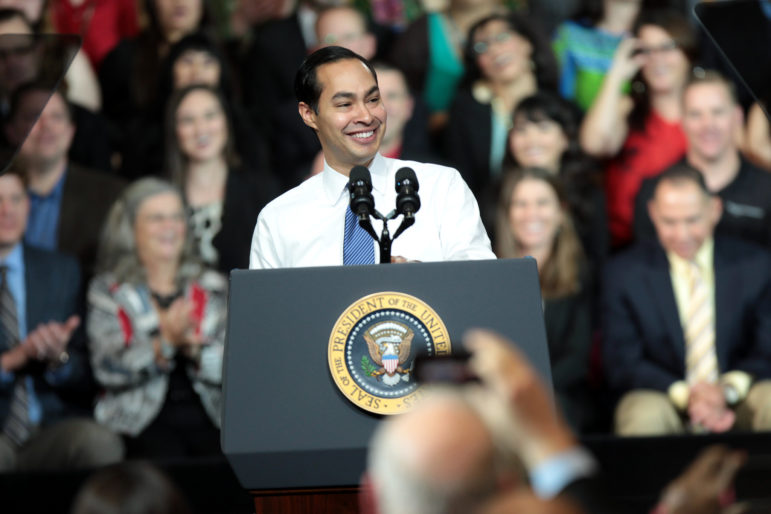
Gage Skidmore
A former mayor and federal housing secretary, Julian Castro was perhaps the most likely presidential candidate to present a plan to address housing need. But three of his rivals have joined him.
Housing costs are rising, affordability is challenged from city streets to rural counties, and climate change is making resilient housing an ever more precious commodity. Will that make housing a top issue in the 2020 presidential race? So far, four candidates have proposed detailed housing plans and others have talked broadly about the topic.
Here’s a look at the key housing proposals in the 2020 Democratic Presidential Primary.
Elizabeth Warren
Elizabeth “I gotta plan for that” Warren is the only Democratic candidate with a housing plan that is fully formed and already on the cutting board in Congress. She introduced the American Housing and Economic Mobility Act once last year and again with revisions this March. Fellow presidential candidate Kirsten Gillibrand co-sponsors the bill.
The bill revolves around four main goals: reduce rents for lower- and middle- class families; close the racial barriers to housing that the federal government created decades ago with redlining; remove other kinds of discrimination from affordable housing; and finally, end Wall Street’s heavy influence on the housing market.
Here’s how she hopes to make it happen:
• Invest in affordable housing programs: Warren’s plan promises $500 billion over ten years to build and rehabilitate affordable housing, with almost all of that going to the Housing Trust Fund, a HUD affordable housing production program. The leftover cash includes over $500 million going into the USDA’s Rural Housing Service, $2.5 billion into the Indian Housing Block Grant and the Native Hawaiian Housing Block Grant, and $4 billion into creating a new grant called the Middle-Class Housing Emergency Fund, designed to help fund housing construction for middle-class families specifically in areas where affordable housing is scarce. A large portion of the $500 billion will be shouldered by private-public partnerships, which puts Warren in line with President Obama’s housing policy. To pay for the rest, the bill proposes a lower cap on the estate tax. Instead of taxing inheritances starting at $22 million, Warren proposes the tax start at $7 million, adding about 14,000 more multi-million dollar families to the pool of funding.
Read more:

On City Streets and in Wild Landscapes, the Fight for America’s Soul in 2020 is About Land
• Amend Zoning Rules: Warren promises to curb cities’ exclusionary zoning policies, like mandatory parking requirements, development fees or minimum lot sizes, which a report from 2015 says caused a massive increase in segregation. Warren’s plan to incentivize cities to axe these policies? Dangle a $10 billion carrot. Her bill proposes a new grant program that cities can apply for in order to build infrastructure, schools or parks. But cities must make an effort to reform these land rules to be eligible for the grant. Jenny Schuetz of Brookings Institute told the Atlantic that Warren’s incentive to squash exclusionary zoning may fall short, as many of the neighborhoods making use of those land rules are wealthy enough not to need the grant she is offering.
• Down-Payment Assistance: This is Warren’s shot at dismantling redlining, a set of Federal Housing Administration policies from the 1930s mapping which neighborhoods were safe for banks to make investments, and which were off-limits for issuing mortgages; predominantly Black and Latino neighborhoods were marked as red or undesirable. Warren proposes a substantial housing grant for residents in these neighborhoods, provided that they have lived there for four-or-more years, qualify as low-income and are first-time home-buyers. The grant is aimed towards eliminating or easing the cost of a down payment on a home for minorities in disadvantaged areas.
• Housing for all (expanded): Warren plans to expand rights under the Fair Housing Act, which currently prohibits landlords from discriminating on the basis of sex or race. Her bill proposes to expand the act to include sexual orientation, gender identity, marital status, veteran status, and the source of one’s income, like a housing voucher.
• Crack down on Real Estate Owned (REO) Mortgages: When the FHA acquires single-family homes through foreclosure, it often sells those homes to private equity firms like Blackstone. These firms, in turn, will hike up the price of those homes. Warren’s bill aims to stop this cycle. She would mandate that a minimum of 75 percent of these foreclosed homes are sold directly to an individual owner/occupant, or to a community group that will rehabilitate the home and sell it directly to an owner/occupant.
Get the best of City Limits news in your inbox.
Select any of our free weekly newsletters and stay informed on the latest policy-focused, independent news.
Cory Booker
Cory Booker released his housing plan three weeks before the first Democratic presidential debate, and it made waves for some unique policy proposals. Some of the New Jersey senator’s plan mirrors other candidates like Warren and Kamala Harris, and in other areas, Booker stands out.
Here’s the breakdown:
• Huge Tax Breaks: Booker made headlines in June for his proposed tax break for renters. The senator’s housing plan promises a tax break that will make up the difference between 30 percent of a renter’s income and how much they’re paying in market-rate rent (capped at the neighborhood fair market rent). The policy is aimed at helping a record high number of people in the U.S. who are rent-burdened, assuring that no one in the country is spending more than 30 percent of their income on rent. Booker says the median family would earn $4,800 yearly and the break would impact 57 million people. Booker’s campaign estimated the tax break would cost $134 billion annually, and was vague on how Congress would front the bill. Like Warren, Booker has proposed changing the cap on the estate tax. He has also suggested rolling back the tax breaks that Trump’s tax plan put into effect.
• Amend Land Rules: Booker, like Warren, also has his sights set on fighting exclusionary zoning. And he’s wielding a similar carrot-dangling method. But Booker’s incentive involves a $16 billion carrot of existing grant programs within the Federal Department of Housing and Urban Development and the Federal Department of Transportation. Booker’s plan mandates all that money be granted to local governments who are “demonstrating progress towards reducing barriers to affordable housing.”
• Building and Preserving Housing: Booker’s plan allots $40 billion annually to the Housing Trust Fund, still coming $100 billion shy of Warren’s plan if implemented across 10 years. Booker also mentions rural and Indian housing grants in his plan, but doesn’t specify how much money he would invest in them.
• Right to Counsel: The former Newark mayor hopes to enact New York City’s protections for tenants nationwide. Booker’s plan proposes an Eviction Right to Counsel Fund to make sure tenants fighting eviction all have access to legal counsel. A similar program passed through New York City Council in 2017.
• Housing for all (expanded): Like Warren, Booker wants to expand the Fair Housing Act to include sexual orientation and gender identity. He also mentions putting an end to housing discrimination based on income vouchers.
• Supporting the formerly incarcerated: Booker says he wants to end discriminatory practices that keep those with arrest records or time-served from accessing affordable housing, though he doesn’t say how.
Other tenets of Booker’s plan include restoring the fair housing protections that President Donald Trump eliminated, passing legislation to end tenant blacklisting and allotting $7 billion annually to HUD’s McKinney-Vento Homeless Assistance Grants program, which administers homeless services across the country.
Kamala Harris
Kamala Harris’s housing policy, proposed in July, centers on unraveling the lasting effects of redlining and closing the racial gap in homeownership.
Here’s how she plans to do it:
• Down-payment and Closing Cost Assistance: The California senator is proposing a $100 billion grant for homebuyers who live or rent in historically redlined areas. The program could offer up to $25,000 to each individual homebuyer to cover a downpayment and the cost of closing a deal. Harris’ plan differs from Warren’s in that the homebuyers must have lived in the neighborhood for 10 years instead of four.
• Credit Scores: Credit scores often serve as barriers for first-time home-buyers and renters, as many low-income residents are “credit invisible” or simply do not have credit. Harris wants to give Americans more opportunities to build up their credit by amending the Fair Credit Reporting Act to include rent payments, and payments on a phone bill and other utilities as a part of a person’s credit score. That way those who are regular on those payments can more easily earn positive credit scores.
From the archives:
 Campaign 2012: The Urban Agenda
Campaign 2012: The Urban Agenda
January 2012: From Truman to Obama, from immigration in Detroit to housing in New Orleans, these articles look at how cities have fared in recent presidential races and the federal issues facing America’s cities today.
• Fight lending discrimination: Harris’ housing focus leans heavily on the homeowner, and breaking down existing barriers for Black and Latino families to break into homebuying. This requires strengthening loan and mortgage lending discrimintaion laws, she says. She wants to update the Home Mortgage Disclosure Act to increase transparency between listing agents and borrowers. Harris also hinted at better regulating banks that have had a history of wrongfully guiding borrowers into predatory loans.
• Fighting public housing discrimination: This is an issue that Harris more directly addresses than her competing candidates. She wants to expand HUD’s fair housing program to ban public housing application discrimination based on gender identity, marital status, source of income, and sexual identity. She also mentions arming the Department of Justice with more money to go after these kinds of discrimination.
• Home-buying education: Harris plans to invest in more funding for the Housing Education and Counseling (HEC) which helps first-time home buyers learn the ins and outs and how not to get scammed by lenders.
• Tax Breaks for renters: This wasn’t in her homeownership gap proposal, but in April, Harris introduced a bill called the Rent Relief Act, proposing that renters living in government-subsidized housing who are still paying more than 30 percent of their income receive a tax credit worth one month’s rent. The tax credit proposal is fiscally smaller and less wide-reaching than Senator Booker’s, who promises his tax break to any renter, not just those who live in subsidized housing.
Julian Castro
Once the United States Secretary of Housing and Urban Development and President Obama’s youngest cabinet member, Julian Castro naturally has a sweeping housing plan on his campaign website.
Here are the core tenets of his plan:
• Housing vouchers: Castro’s plan aligns closely with the broader goals of HUD during the Obama administration, which leaned heavily on public-private partnerships. Thus it makes sense that the first stop on his housing agenda is more funding for housing vouchers. Castro would expand the Housing Voucher Choice program to cover all families who make under 50 percent of the area median income. And he’d prohibit landlords from discriminating against families using housing vouchers.
• Renter’s tax credit: Like Booker and Warren, Castro proposes a tax credit for renters. Like Booker’s plan, Castro would extend a tax credit to individuals whose rent exceeds 30 percent of their income, provided that their income is 100 percent or less of the AMI.
• Housing Trust Fund: Like his fellow 2020 candidates, Castro proposed spending more on HUD’s fund to build and rehabilitate affordable housing. He’d spend $45 billion per year on the HTF, a little bit more than Booker and almost matching Warren’s bill.
• Public Housing: Castro, unlike other candidates, says he will use part of the HTF to rehabilitate and build more public housing. He promises 5 billion every year for 10 years just to address the laundry list of outstanding repairs in the country’s public housing buildings.
• Amend Land Rules: Castro goes a step farther than Warren and Harris to crack down on exclusionary zoning. He wants to create a Presidential Commision on Zoning Reform that would make sure neighborhoods aren’t abusing land rules to further segregation. He also proposes that $2 billion of grants for communities who are working to undo exclusionary zoning laws.
• Decriminalize homelessness and put money into ending homelessness • : Castro has an extensive plan for this detailed on his website. The gist is he wants to triple funding to grants fighting homelessness and he wants to encourage cities to put an end to loitering and vagrancy laws.
• Expand the Fair Housing Act: Just like Warren and Booker, Castro wants to amend the Fair Housing Act to include sexual orientation and gender identity. He also wants to expand it so that the Office of Fair Housing and Equal Opportunity can investigate the role banks, technology companies and other corporations might play in driving up the cost of housing.
• Fight gentrification: Castro is the only candidate to call out gentrification by name in his housing agenda. “Revitalizing communities” is core tenet to Castro’s plan, which involves investing $175 billion annually into the Small Business Association’s loan program, and, vaguely, maintaining efforts to prevent displacement.
• Climate Goals: Another unique tenet to Castro’s plan is to integrate his climate goals into his housing plans. Castro aligns himself with the Green New Deal in incorporating public transportation and capping carbon emissions into his goals for affordable housing.
Pete Buttigeg
Pete Buttigeg’s campaign website breifly mentions his plan for affordable housing. He vaguely addresses the need to build more affordable housing, to undue land use rules that enable exclusionary zoning and to close the racial homebuying gap caused by redlining.
Of these goals, Buttigeg has a comprehensive plan for one of them: closing the race gap. The Indiana mayor has a sprawling plan called the 21st Century Community Homestead Act that will fund a public trust that would buy up abandoned properties in historically redlined neighborhoods across the U.S. and redistribute the properties to long-time residents and homeowners living in that neighborhood or to community groups who will work to rehabilitate the properties and then use them for community spaces or affordable housing. You can read more about the plan here.
Bernie Sanders
Bernie Sanders had a sweeping housing plan when he ran in the 2016 election against Hillary Clinton. In this primary’s campaign, Sanders has yet to release an updated policy plan. However, on August 6, he promised at a California town hall to back a national bill on rent control, and boost affordable housing construction if he were elected.
The other 2020 candidates’ housing plans look a lot like the Vermont senator’s 2016 housing agenda. It included down-payment assistance for first-time homebuyers, credit score reform and preventing predatory lending. You can read more about it here.









2 thoughts on “A Primer on the Democratic Presidential Candidates’ Housing Plans”
Where is Tulsi Gabbard? What do you think of her contention that US regime-change wars profoundly divert needed monies from domestic benefits to counterproductive wars.
Pingback: Sanders Affordable Housing Plan Proposes National Rent Control - Affordable Housing Online